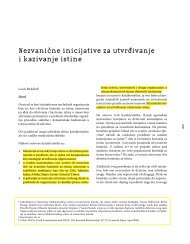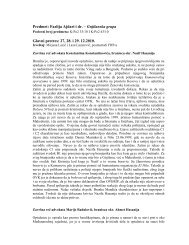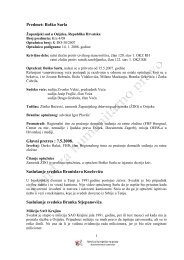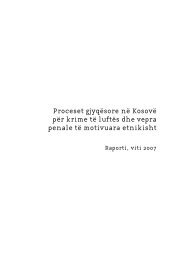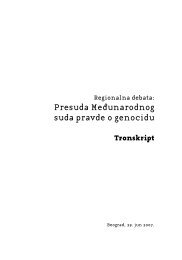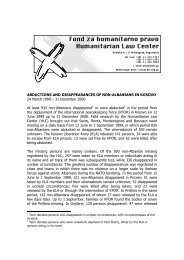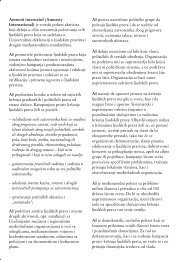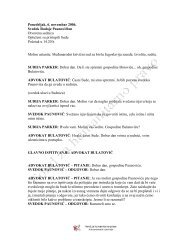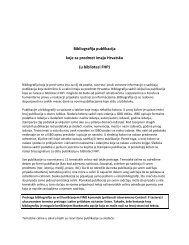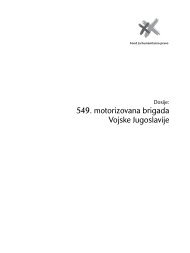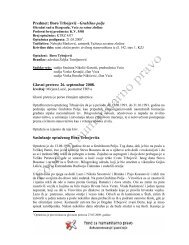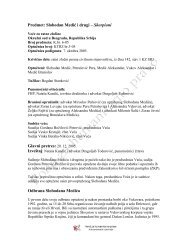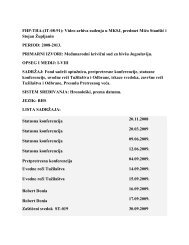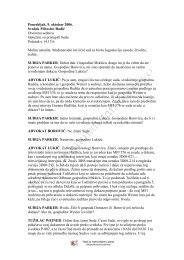here - Humanitarian Law Center/Fond za humanitarno pravo
here - Humanitarian Law Center/Fond za humanitarno pravo
here - Humanitarian Law Center/Fond za humanitarno pravo
Create successful ePaper yourself
Turn your PDF publications into a flip-book with our unique Google optimized e-Paper software.
The trial of this case commenced on 7 October 2010 at the Higher Court in Belgrade 169 . After six<br />
hearing days and with 10 witnesses questioned, the court delivered a judgment on 23 September<br />
2011 finding the accused guilty as charged and sentencing him to 12 years in prison. 170<br />
Marić’s defense counsel appealed against the judgment on grounds of serious procedural errors<br />
i.e. the court failed to offer reasons concerning its decisions on decisive facts and consequently it<br />
was not possible to assess the lawfulness and correctness of the decision. The appeal also cited<br />
erroneous and incomplete establishment of the facts, violation of CC provisions and violation of<br />
Article 6 of the ECHR (right to a fair trial).<br />
On 5 March 2012, the Court of Appeal in Belgrade handed down a judgment dismissing the<br />
appeal as unfounded and confirming the first-instance judgment. 171<br />
Analysis of proceedings<br />
As stipulated by the <strong>Law</strong> on Organisation and Jurisdiction of Government Bodies in War Crimes<br />
Proceedings, The Higher Court in Belgrade has jurisdiction to try criminal offences committed on<br />
the territory of the former SFR of Yugoslavia, regardless of the nationality of the perpetrators and<br />
victims, including, among others, crimes against humanity and international law referred to in<br />
Chapter XVI of the CC of the SFRY and grave braches of international humanitarian law<br />
committed on the territory of the former SFRJ since 1 January 1991, as set forth in the ICTY<br />
Statute. It is t<strong>here</strong>fore not clear why the Republic of Serbia did not transfer the Rastovac case to<br />
the Republic of Croatia as the incident in question occurred in Croatia, the late Petar Slijepčević<br />
was a citizen of the Republic of Croatia, and was resident in the Republic of Croatia, just like the<br />
indictee, Veljko Marić, and relevant witnesses. The Republic of Serbia should have, for reasons<br />
of efficiency and fairness and in order to strengthen confidence in judicial cooperation between<br />
the two states, extradited Veljko Marić to Croatia and transferred his case to the Office of the<br />
Attorney General of the Republic of Croatia, along with all the evidence available to it, in<br />
keeping with the Agreement on Cooperation that these two states have signed 172 .<br />
The 12-year prison sentence imposed on the indictee is a penalty commensurate with the severity<br />
of the offence and the degree of indictee’s responsibility.<br />
169 Members of the trial chamber: judge Rastko Popović (presiding), judge Vinka Beraha Nikićević and judge<br />
Snežana Nikolić Garotić.<br />
170 For an analysis of this judgment, see the Report on War Crimes Trials in Serbia in 2011, HLC, p. 56.<br />
171 Decisions by the Court of Appeal and Higher Court in Belgrade are available at www.hlc-rdc.org.<br />
172 Agreement on Mutual Cooperation in the Prosecution of Perpetrators of War Crimes, Crimes against Humanity<br />
and Genocide, signed by the Office of the War Crimes Prosecutor of the RS and the Office of the Attorney General<br />
of the RH on 13 October 2006.<br />
73




